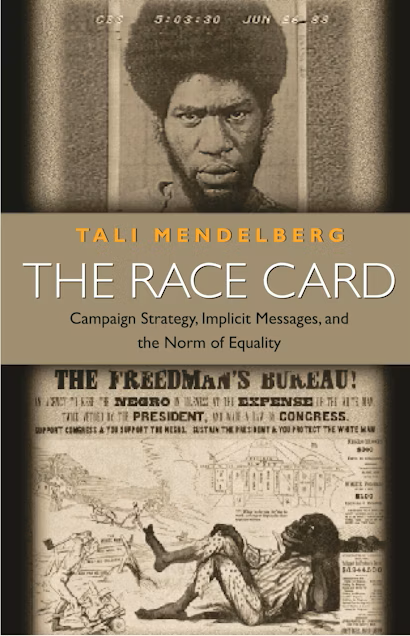The Race Card
Campaign Strategy, Implicit Messages, and the Norm of Equality

Winner of the Best Book Award
Winner of the 2017 Philip E. Converse Book Award, Elections, Public Opinion, and Voting Section of the American Political Science Association
Order from Press here
"The book is an important contribution to political psychology: a case study in one critical realm of politics (interracial or ethnic relations) of how affect and cognition interact with political culture, processes, incentives, and institutions to shape political behavior at both the elite and mass levels." - Robert Entman, Political Psychology
"Mendelberg uses historical and experimental surveys and concludes that implicit communication about race is far more prevalent today among dominant groups and far more deadly because it is less visible than the overt racism of the 1960s. Mendelberg's book is a must read." - Choice
"[G]roundbreaking on a number of levels and deserves attention from students of race, mass media effects, campaigns, elite behavior, and public opinion. . . It should be praised for the sheer volume of empirical evidence it presents and for the high risk of disconfirmation this poses for its central thesis. " - Nicholas Valentino, Public Opinion Quarterly
"This book attempts something new and innovative within political science but it does so through a careful deployment of theoretical and methodological procedures acceptable to political scientists." - Andy R. Brown, Ethnic and Racial Studies
"Mendelberg mines an impressive array of empirical evidence in support of her thesis. . . . Her book merits a careful reading by sociologists, psychologists, political scientists, historians, and communications scientists interested in norms, racial attitudes, and political campaigns." - Felicia Pratto, American Journal of Sociology
"The Race Card offers a methodologically rich and convincing account of the impact of subtle race cues in contemporary American politics. Although her thesis is a controversial one, Mendelberg develops a careful and cogent argument that racial attitudes can have a substantial effect on candidate evaluations. . . . Mendelberg's book should be regarded as a major contribution to the field of race and politics." - Vince Hutchings, American Political Science Review
"By almost any definition this is a readable book. . . . Mendelberg has made a substantive contribution to our understanding of the political and cultural implications for a nation whose majority cannot seem to find a model other than white or black." - Kenneth O'Reilly,Journal of Southern History
"The greatest strength of Mendelberg's work is that she uses numerous types of methods to support her claims. . . . She provides the most compelling evidence possible that the Bush campaign did, in fact, intend the Horton strategy to be implicitly about race. . . . Mendelberg goes further than just analyzing it, however. Through creative experiments, she is able more persuasively to make her claim about the effectiveness of implicit racial messages and the importance of norms. . . . Overall, this is an engaging book about an extremely relevant subject. It is strongly recommended." - Matthew Streb, Journal of American History
